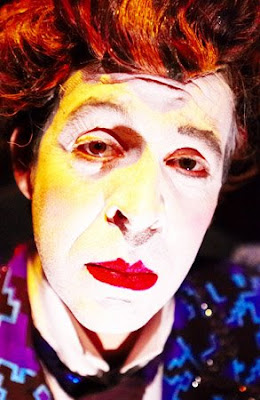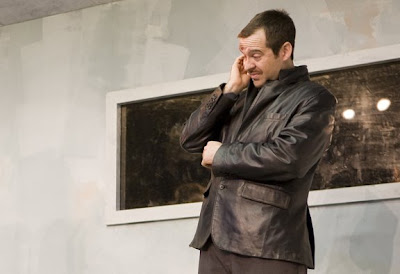1) What the fuck is going on?
In my little world the play is going on and my girlfriend left to do a job in Saskatchewan, and Toronto sports teams all collectively suck. (That sounds depressing, I’m actually very happy.)
2) What’s your favourite thing about acting in Brendan Gall’s new play, Alias Godot, at the Tarragon Theatre?
Brendan’s play is amazing to act in because he has a very deep understanding of how comedy and tragedy are inclusive of each other. The yin-yang of life man, Brendan is my guru.
3) Does Alias Godot arrive at any conclusions about Samuel Beckett’s original “Godot”?
To be quite honest, I didn’t use Waiting for Godot as any reference point in my process and cannot speak to that question. The play exists in some parallel universe to the original I know, but it was meaningless to me in a way, no disrespect to the great Beckett intended.
4) What was your first reaction after reading Gall’s script?
My first reaction to his play was:
1. hope I get to be in it
2. hilarious.
3. what the fuck is it about?
5) How would you describe Richard Rose’s approach to directing this project?
Richard’s approach to this was let’s get into the truth of the relationships, otherwise it will just be a weird-fest, that’s my interpretation anyway.
6) Do you have any unifying theories that inform your approach to comic acting?
There are no rules to comic acting, obviously timing is everything, but sometimes the opposite is funny and sometimes the obvious is funny. But truth is important, and humans are flawed, imperfect creatures and the good comic actor gets that. So there I said there are no rules and then went on to say a bunch of ’em – that’s funny!
 Paul Braunstein as Sir Wilfrid Laurier in Video Cabaret‘s Laurier.
Paul Braunstein as Sir Wilfrid Laurier in Video Cabaret‘s Laurier.Photo by Michael Cooper.
7) What do you look for when deciding on whether or not to commit to a new project?
For me a new project is made attractive by the people involved, the timing of it, the quality of the script, and if I will be challenged by it.
8) How do you feel about the fact that so many members of your family are active in the theatre community?
Having my family involved in acting is a blessing and a curse, on the one hand they get the peculiarities of the biz, but on the other hand I don’t feel like the avant-garde black sheep type who carved unknown territory for themselves . . . but usually I don’t give it much thought, I mean, when I’m on stage I’m not thinking about mom.
9) If you could change just one thing about theatre in Toronto, what would it be?
What would I change? I don’t know – maybe a company that produces the work of young people, something cool, something that taps into the immediacy of contemporary culture. The classics are important, but think about all the great art forms of the world – they destroyed and rebelled against the art that existed as much as they borrowed from it.
Brendan is that kind of writer, he’s a guy from the Internet generation who also has a love of theatre, so he’s bringing something that feels very new even though the rhythms of the comedy have a classic feel.
10) Why is theatre important?
Theatre is important if people feel that the stories being told connect to the things they think and feel in their lives. And as long as we continue to explore and grow with the way the world changes (and stays the same) theatre will be important. But it’s not the art form that is important, it’s what it says that is. We need stories, we need to lose ourselves in the victories and losses of others – it makes us know that we exist.

Paul, I totally agree – Toronto sports teams are a disaster. Just kidding. Well, not really.
But I also like what you had to say about relevancy and theatre. The need to rebel against the classics, while understanding them to make something new and that “it’s not the art form that is important, it’s what it says that is.”
True dat.
…”maybe a company that produces the work of young people, something cool, something that taps into the immediacy of contemporary culture.”
Can I get an Amen! Sing it brother, the only way to convert a new audience. Talk about them, their time, their place. I think it’s great that you want to do Chekhov, but you’re not moving your art form forward.
…”think about all the great art forms of the world – they destroyed and rebelled against the art that existed as much as they borrowed from it.”
The weight of the truth in this statement is tremendous, and too much to bear right now. Thanks for giving me my main course of consideration for the week…
“Theatre is important if people feel that the stories being told connect to the things they think and feel in their lives.”
To me, this is a great reminder that theatre, just as any other art form, has to argue for it relevance with every fibre of its being.